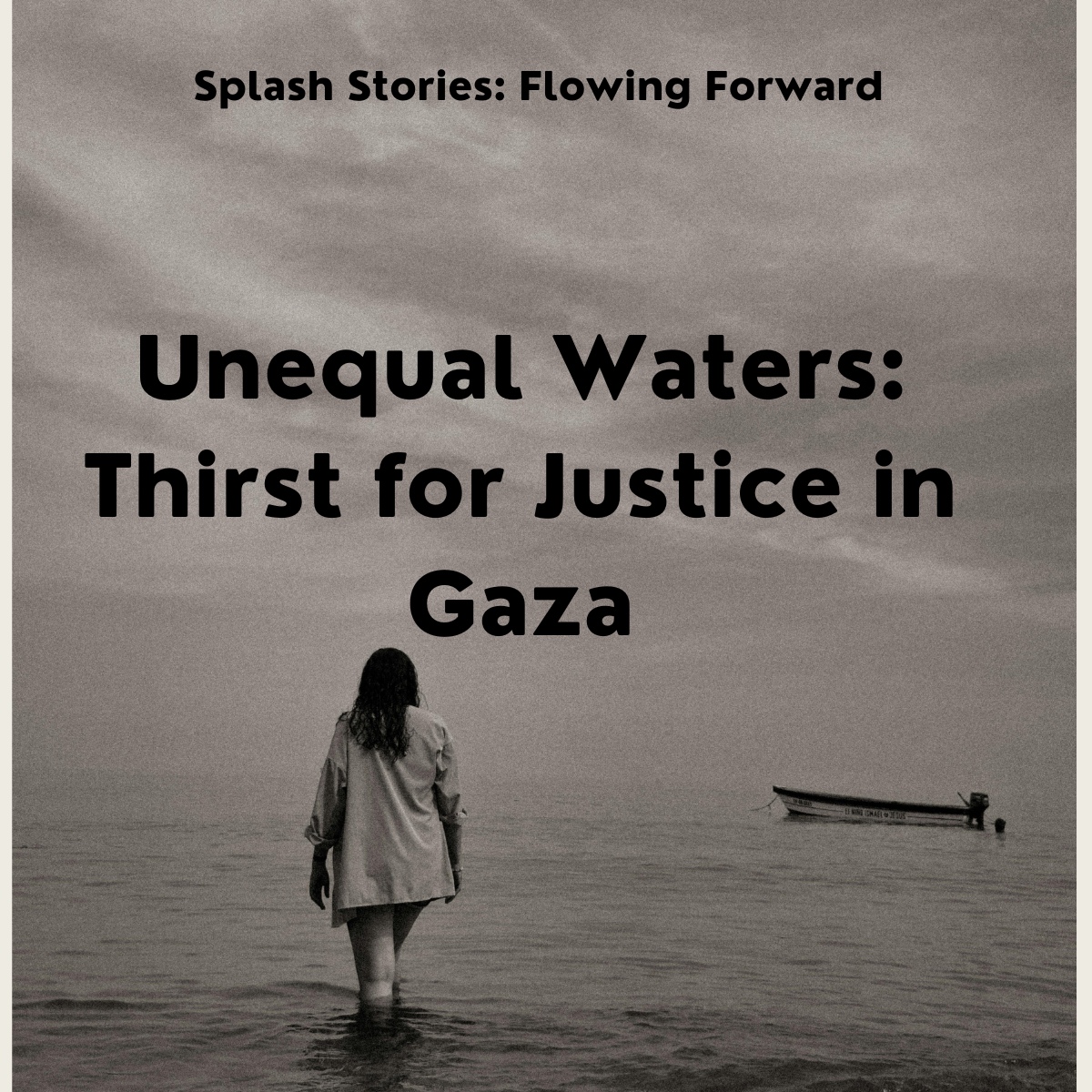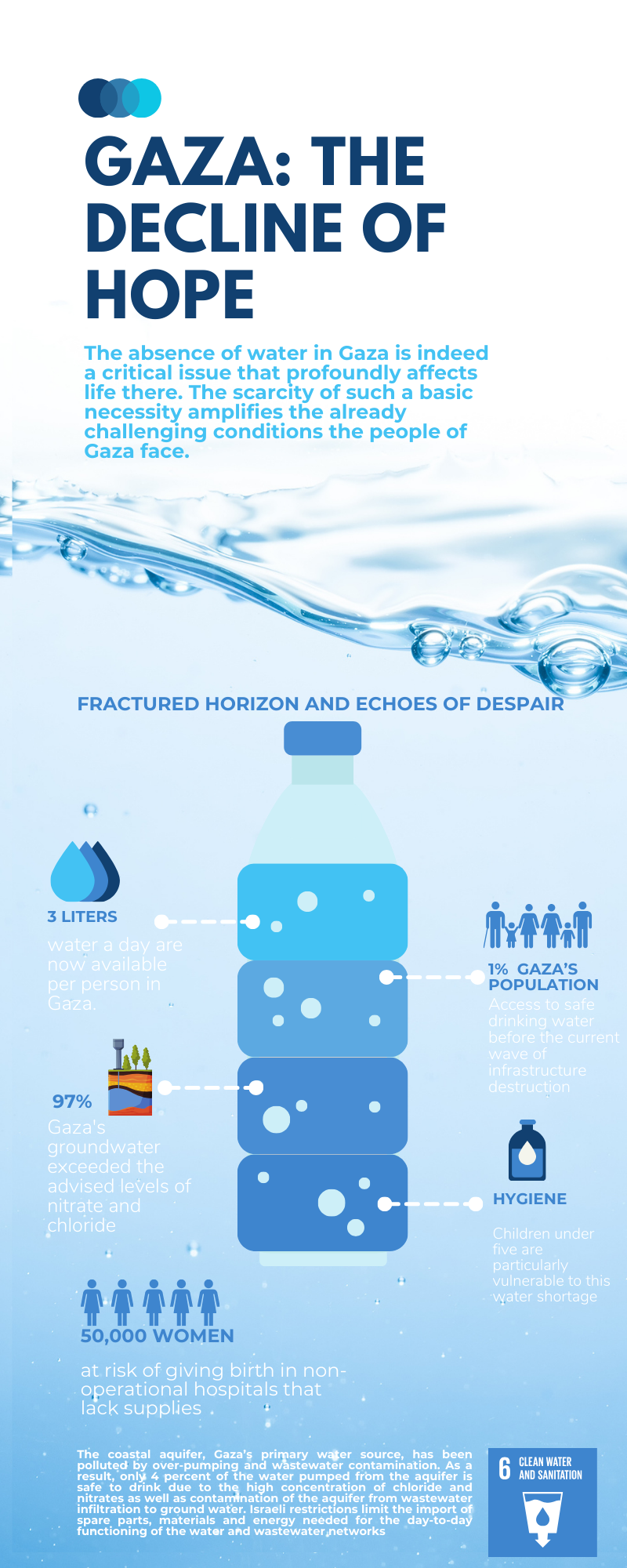Unequal Waters: Thirst for Justice in Gaza

“All human beings are born free and equal in dignity and rights." ...
Article one, the Universal Declaration of Human Rights
“Everyone has the right to life, liberty, and security.” …
Article three, the Universal Declaration of Human Rights
Unfair access to water violates these principles in the Occupied Palestinian Territories (OPT), which Israel has controlled since 1967. Gaza, in particular, is experiencing a severe water crisis, which the ongoing conflict has made worse. The situation in Gaza indeed raises questions about the universality of human rights. The ongoing struggles and crises faced by the people of Gaza, especially concerning their access to basic necessities like water, spotlight a disheartening truth: the apparent neglect of these universal rights in certain geopolitical contexts.

In the aftermath of Israel’s occupation of the West Bank, East Jerusalem, and the Gaza Strip in June 1967, full control over water resources and related infrastructure in the Occupied Palestinian Territories (OPT) fell into the hands of the Israeli military. Fast forward 75 years later, Israel still wields power over Palestinian access to water resources in the OPT. Moreover, the control does not quite match the essential needs and equitable distribution of shared water resources. With over sixteen years of war and blockade, the economy has been devastated, plunging much of the region into severe poverty. Nowhere is this struggle more evident than in Gaza, where the population faces tremendous challenges securing something as fundamental as water, a basic necessity for human survival.
Under the framework of Oslo II (1995), Israel regulates water allocations for Palestinians, following a discriminatory system. This control extends to permits required for any new water installations, diminishing Palestinian communities' ability to dig wells or develop water infrastructure. The discrepancy in water consumption between Israelis and Palestinians is stark: the average Israeli uses about 240 liters of water daily, three times more than the consumption of a Palestinian in the West Bank (82 liters) and a staggering 80 times more than what individuals in Gaza currently have access to.

Violations of Palestinians’ right to water encompass a range of issues:
- Israeli Advantage: Continuous water supply by Mekorot at lower costs
- West Bank Challenges: Irregular access to water during the summer months creates hardships.
- Gaza's Water Crisis: Coastal Aquifer Depletion Leads to Contamination
- Network Failures: Deteriorating infrastructure causes significant losses of 30–50% in water distribution.
- Village Shortages: 26% of West Bank households lack access to piped water.
- Water Purchases: Palestinians are compelled to buy from Mekorot or costly private suppliers.
In 2021, Gaza heavily depended on groundwater wells, which constituted approximately 90% of its water, as per the Palestinian Water Authority. The remaining 10% was sourced from either desalination facilities or procurement from Israel’s primary water entity, Mekorot. This distribution of water sources shapes Gaza's water infrastructure and supply system. The World Bank Group highlights that Gaza's water supply has been in a state of crisis since 2005. Alarming statistics from UNICEF in 2020 revealed that only 10 percent of Gaza's population had direct access to clean, safe drinking water. This leaves nearly half the population, approximately one million people, in need of water and sanitation interventions.

In the heart of Gaza, a relentless storm of Israeli military actions has raged since October 7, 2023. This war, a thundering crescendo in Gaza's troubled history, exacerbates the persistent battle for water. Its impact reverberates across the region, underscoring how swiftly conflict chokes access to the lifeline of clean water. But this story isn't just about a recent outbreak of violence; it's about the painful escalation of a struggle that has silently simmered for too long.
The devastation caused by bombings, blockades, and import restrictions has shattered Gaza's water infrastructure. With 2.2 million residents, half of whom are children, their survival depends on a mere three liters daily per person. To put this into perspective, among 100 individuals, there were only six bottles of water available for sharing.
The right to water
"The human right to water is indispensable for leading a life in human dignity."
UN Committee on Economic, Social and Cultural Rights, General Comment No. 15, para 1
According to OXFAM, the present water supply in Gaza now accounts for a mere 17% of its status before October 7, 2023. Prior to the siege, Gaza had access to over 344 million liters of water from groundwater wells and pipelines. Now, the available water has drastically shrunk to only 58 million liters, barely a fifth of the previous supply. If the fuel scarcity persists, this could plummet to less than 25 million liters, representing a stark seven percent of the previous total.
The control of the three primary water pipelines in Gaza rests with Israel. As of October 8, the pipeline from Israel to northern Gaza has been shut down. In the southern area, while Israel reinstated water supply to Khan Younis on October 15, it was abruptly cut off again two weeks later.
In Gaza, six water treatment facilities operate, dependent on the local power grid. Historically, about half of their electricity was sourced from Israel. However, since October 11, that supply has been severed. To compound the challenge, these plants have backup diesel generators, but even those have been affected by Israel's reduction in fuel supplies.
As of November 16, the critical functions sustaining water supply in Gaza will cease. This includes pumping water from wells, desalination processes for drinking water, and water distribution through the primary network. Moreover, the available drinkable fresh water has dwindled to under four percent, while the nearby sea is contaminated by sewage.
As reported by OCHA, the water crisis in Gaza has escalated to dire levels:
- Municipal groundwater sources now produce less than 5% of their pre-conflict levels.
- Seawater desalination plants, providing 7% of water pre-conflict, are currently inactive.
- Fuel shortages halt water trucking operations and restrict access to bottled water.
- Small purification plants operated by private vendors have become the primary water providers. .
- Daily water consumption has plummeted to a mere 3 liters per person.
- Residents are resorting to brackish water from agricultural wells, posing health risks.
As reported by OCHA, the water crisis in Gaza has escalated significantly:
- Municipal groundwater sources now produce less than 5% compared to pre-conflict levels.
- Seawater desalination plants, accounting for 7% of pre-conflict water, are currently inactive.
- Fuel shortages have ceased water trucking operations and restricted access to bottled water.
- Small purification plants operated by private vendors have become the primary water providers.
- Daily water consumption has plummeted to a mere 3 liters per person.
- Residents are resorting to brackish water from agricultural wells, posing health risks.
The vast majority, around 96%, of water sourced from the coastal aquifer is considered unsafe for drinking due to contamination. As a result, many families are forced to purchase drinking water from street vendors, imposing a financial burden on households and heightening risks, especially for women and children.
"Our water is salty as if you are drinking from the sea directly."
Um Amir, 50, and a mother of 11
The scarcity of water has become a dire issue for survival. The destruction of water and sanitation networks, along with the blockade on essential supplies, is resulting in:
- Gazans resort to non-potable sources, risking diseases like cholera.
- Accumulating sewage poses health hazards without treatment facilities.
- Water scarcity affects personal hygiene, endangering young children.
- Limited water creates challenges for women with formula and menstruation.
- Hospitals lacking water endanger patients and healthcare workers.
- Sewage discharge causes environmental damage, risking civilian livelihoods.
Recent research has unveiled alarming statistics about Gaza's groundwater. A staggering 97% of Gaza's groundwater exceeded the advised levels of nitrate and chloride, according to the World Health Organization's guidelines for safe drinking water."
The aftermath of the bombings is hitting hard—thousands of little babies are battling severe diarrhea. With conditions worsening, it feels like it's only a matter of time before waterborne diseases like cholera take hold among those who make it through." While less visible than the casualties of war, the silent deaths of children due to thirst and disease are just as deadly, if not more so.

Despite the belief that water could pave the way to peace, this year has revealed a different reality. At least 228 water-related conflicts were recorded in 2022, marking an 87% increase from the previous year, as per data from the Pacific Institute database. The people of Gaza, amid their struggle for basic necessities like water and fuel, deserve a break from the bombardment. Clean water shouldn't be wielded as a weapon. A ceasefire centered on water could offer a glimpse of hope, fostering discussions to address the deep-seated issues underlying the conflict, reconciling past injustices, dispelling divisive ideologies, and fostering healing.
The children of Gaza, both the deceased and the barely surviving, along with their mothers and fathers, cannot be seen as acceptable collateral damage. Their lives hold immense value, and their losses cannot be overlooked. Every individual, especially innocent children and civilians, is an integral part of our universal humanity, and their suffering and loss must be acknowledged and addressed.
